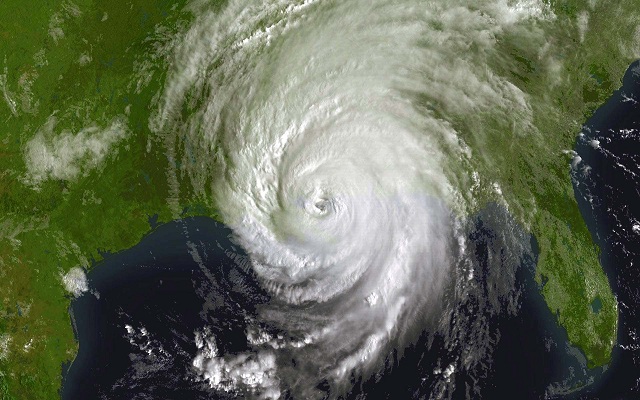That Awful Tribune Column Reveals Capitalism's Nasty Side
By aaroncynic in News on Aug 14, 2015 7:40PM

Hurricane Katrina comes ashore Aug. 29, 2005.
We're still not exactly sure what the Tribune Editorial Board was thinking when they published Kristen McQueary's piece, originally titled "In Chicago, Wishing For A Hurricane Katrina."
The piece, later hastily renamed "Chicago, New Orleans, and rebirth," after a torrent of criticism rained down on both the Trib and McQueary on social media, first wished that Chicago would see its own Katrina-level disaster, and was later updated to explain that we need a metaphorical disaster to wipe away the rot and corruption inside city government.
McQueary's piece not only disregards the thousands of people who died, were displaced, and generally suffered through the disaster and its painful aftermath, but it also highlights the gross opportunism of disaster capitalism.
It's also tinged with racism: the column fails to point out that the majority of people who suffered (and still do) the hardest from one of the country’s worst natural disasters in recent memory are people of color. It's not hard to understand the fantasy behind apocalyptic scenarios that clear the metaphorical slate and offer the space to rebuild and make something better. But wishing for a natural disaster that sweeps away thousands of black and brown bodies, people with disabilities and seniors is not only a piss-poor metaphor, but an insult.
The people of New Orleans have been resilient and done their best to rebuild, but not without the type of opportunists McQueary champions when she lauds the exclusionary “free market education system” built in the storm’s wake, or the gutting of organized labor. In fact, as pointed out by Alternet, wealthy businessmen like the Koch Brothers were already viewing the rubble of New Orleans as a "golden opportunity," even as unidentified bodies still floated through the city. And Secretary of Education Arne Duncan once callously called the disaster the “best thing that happened to the education system in New Orleans.”
David Kaplinsky, a survivor of Katrina, decried the farcical fantasy that somehow, New Orleans is a magnificent utopia after the disaster:
“There is no balance to her idealized perception of a utopian New Orleans where corruption, overspending, and waste (to her mind, in the form of “unnecessary” city employees) have been thoroughly uprooted. She forgets the fact that in the past ten years New Orleans has seen a mayor federally indicted and jailed for giving his sons’ company prejudicial treatment in city contracts, many thousands of poor New Orleanians still unable or unwilling to return to a city that doesn’t want them, and a New Orleans East that remains utterly blighted and left behind in the overall recovery of the city—and those issues are only the tip of the iceberg.”
Chicago is indeed, “good at hiding its rot,” as McQueary says, but only for those who choose to think of the city as little more than the few square miles inside the Loop. For the rest of us who live in its neighborhoods, particularly those on the South and West Sides, the rot is visible in every boarded up school and foreclosed home on our blocks. We see it clear as day every time we pass a closed mental health clinic or abandoned lot.
It’s painfully obvious when the city has the funds to subsidize new hotels or a village for the NFL draft, but nothing but pocket lint when it comes to public services and pensions.
Saying Chicago needs a metaphorical Katrina is akin to saying we need to further decimate poor neighborhoods of color for the betterment of already-wealthy, white people. It's saying we need to bulldoze over the husks of public services that were gutted by other wealthy white people.
Yes, Chicago needs a lot of work. We do need to clear out the rot inside our city government. We don’t need to do that with a hot take that diminishes the thousands of lives destroyed and marginalized to justify a corporate overhaul of a city that already embraces and celebrates corporate rule. And while her Tweet that now sits at the top of the page says that we just don’t understand what she was writing about—we definitely understand the skewed vision of rebirth she thinks a cataclysm would bring.
If you read the piece, it's about finances and government. I would never diminish the tragedy of thousands of lives lost.
— Kristen McQueary (@StatehouseChick) August 13, 2015